Week ending 25 July 2020
REGIONAL OVERVIEW
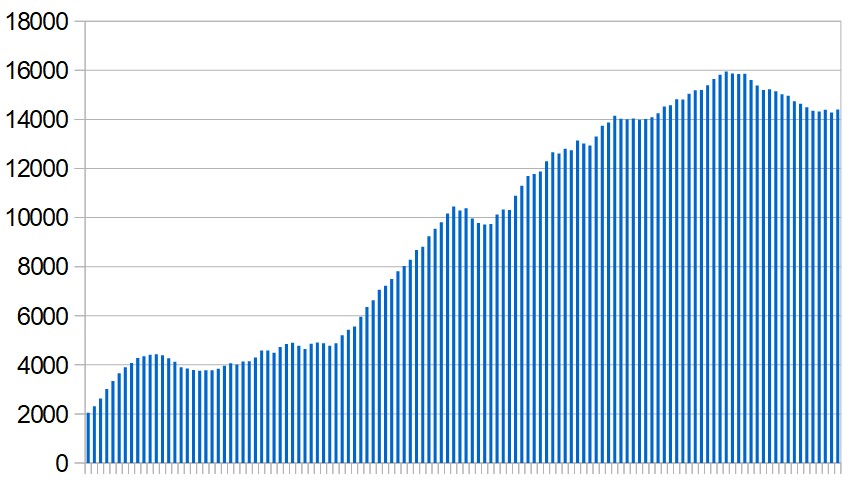 |
More than 1.2 million people in the Middle East and North Africa have so far been infected with the Covid-19 coronavirus. Across the 20 countries monitored new cases currently average around 14,000 a day, though many others are not recorded in the official fgures.
Three countries in the region – Iraq, Iran and Saudi Arabia – are still reporting more than 2,000 new cases a day, while Israel and Oman are reporting more than 1,000 a day.
The situation in Bahrain, Egypt, Kuwait, Qatar, Saudi Arabia and the UAE appears to be improving. It has worsened significantly in Lebanon and Syria.
The Hajj – the annual Muslim pilgrimage to Mecca which normally attracts millions – will start on Tuesday, limited to just 1,000 participants and with strict precautions in place. The Hajj culminates in the four-day festival of Eid al-Adha, celebrated by Muslims around the world. Several countries in the region have announced measures to prevent infections spreading during the Eid, including restrictions on social gatherings and the closure of mosques.
Detailed statistics for the region, based on official figures, can be found in this spreadsheet.
Previous situation reports: July 18; July 11; July 4; June 27; June 20.
ALGERIA
Algeria's outbreak is still growing but has slowed recently. Official figures show new cases averaged 602 a day during the past week, compared with 529 a day in the previous week.
Although Algeria has recorded a relatively small number of cases, testing capacity is low – about 2,500 tests a day.
About 2,300 healthcare workers have been infected with Covid-19 and 44 of them have died, the health minister said on Tuesday. There has also been an increase in "physical and verbal attacks on medics, paramedics and administrative staff", according to President Abdelmadjid Tebboune, and a new law is planned to protect them.
Former telecoms minister Moussa Benhamadi is reported to have died from Covid-19. He was awaiting trial on corruption charges after being detained last September. According to his brother, the became ill on July 4 and was not transferred to hospital until July 13.
The state airline, Air Algérie, expects to lose $272 million this year as a result of Covid-19.
For more information see: Covid-19 in Algeria
Confirmed cases: 26,159
New cases in past week: 4,211
Active cases: 7,654
Deaths: 1,136
Tests carried out: (unknown)
BAHRAIN
Bahrain has 22,000 known cases per million inhabitants. This makes it the world's third most infected country after Qatar and French Guiana. However, Bahrain is also one of the world leaders in Covid-19 testing. So far, 45% of its 1.7 million population have been tested.
New infections have been declining recently. This week new cases averaged 426 a day, compared with 518 a day two weeks ago.
Migrant workers account for a high proportion of Covid-19 cases in Bahrain (discussion here).
Gyms and other privately-owned sports facilities in Bahrain are facing a financial crisis as a result of the shutdown and almost half of them may soon go out of business, according to a survey.
On Wednesday the authorities announced that travellers who have valid visas can now enter the country without having to obtain prior permission.
The 25-km causeway linking Bahrain and Saudi Arabia, which was closed on March 7 to prevent spreading the virus, reopened on Thursday.
For more information see: Covid-19 in Bahrain
Confirmed cases: 38,458
New cases in past week: 2,985
Active cases: 3,496
Deaths: 136
Tests carried out: 772,000
EGYPT
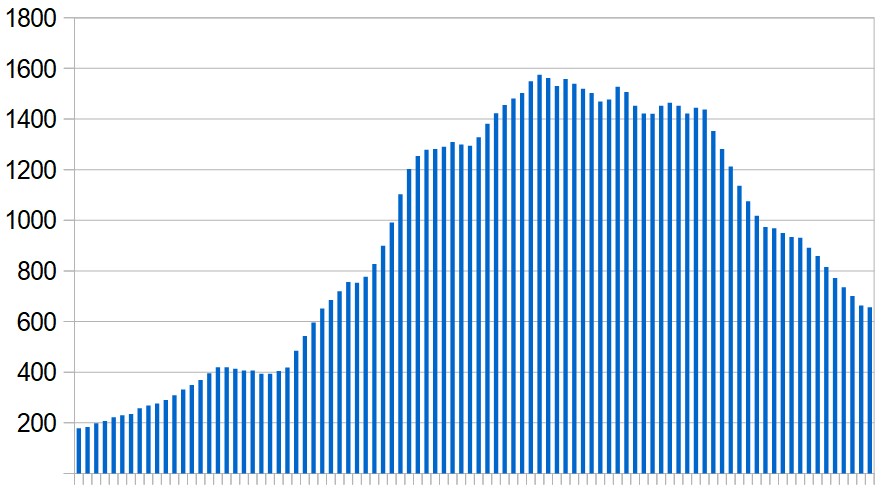 |
New cases peaked in June and have been falling steadily during the past three weeks, according to official figures. This week's average was 657 new cases a day compared with almost 1,600 at the peak. Although this may be partly due to reduced laboratory testing of suspected cases (see previous report) the decrease does seem to be real. One further indication of that is reduced pressure on health services. Smaller numbers of coronavirus-related deaths are also being recorded.
Egypt's strategy is to minimise economic damage by "coexisting" with the virus until a vaccine comes along. The night curfew which had been in force since March ended on June 27 and cafes and restaurants were allowed to reopen, though with some restrictions. The authorities have been especially keen to revive the important tourism industry and Egypt's airports reopened for international flights on July 1.
However, some new precautions have been announced to cover the Eid al-Adha holiday period. Beaches and parks will be closed. Shops must close at 10pm daily, with cafes and restaurants closing at midnight.
For more information see: Covid-19 in Egypt
Confirmed cases: 91,072
New cases in past week: 4,598
Active cases: 54,584
Deaths: 4,518
Tests carried out: 135,000
IRAN
Iran was the first country in the region to be seriously affected by the virus and has since been hit by a second wave. Government figures show an initial wave of infections which peaked at the end of March. It subsided during April, briefly dipping below 1,000 new cases per day but then rose to a new peak in the first week of June. New infections have dropped back a bit since then, but not substantially.
Iran continues to report more coronavirus-related deaths than any other country in the region – currently more than 200 a day.
Confirmed cases: 286,523
New cases in past week: 17,083
Active cases: 22,022
Deaths: 15,389
Tests carried out: 2.3 million
IRAQ
New cases in Iraq rose steeply in June, peaking at just under 2,500 a day in the second week of July. During the past week they averaged 2,363 a day. Official figures are widely believed to understate the scale of the epidemic. Many cases go unreported because of social stigma. Compliance with preventive measures appears to be low and health services are inadequate.
Despite that, Baghdad airport reopened for international flights on Thursday after a four-month closure. The Kurdish authorities in the north say they will reopen Erbil and Sulaymaniyah airports on August 1.
For more information see: Covid-19 in Iraq
Confirmed cases: 104,711
New cases in past week: 16,540
Active cases: 29,231
Deaths: 4,212
Tests carried out: 879,000
ISRAEL
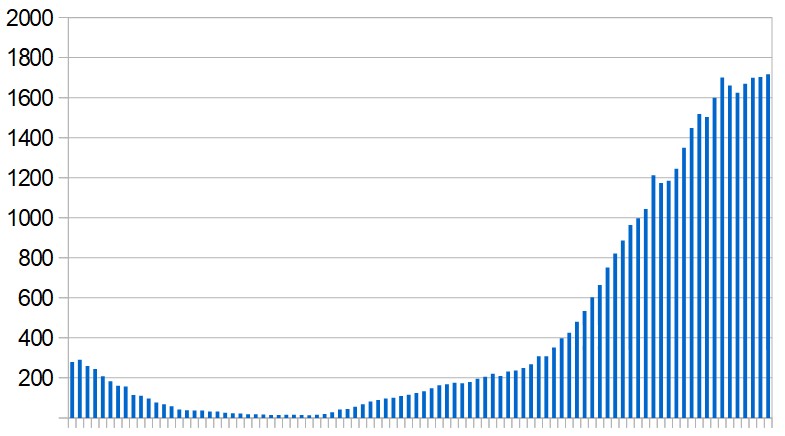 |
After coming close to bringing the epidemic under control, Israel has been hit by a second wave much larger than the first. Almost 60,000 people have now tested positive for the Covid-19 virus – 12,000 of them during the past four weeks.
The first wave peaked at around 600 new cases a day in early April. Efforts to control it were intially successful and by the second half of May new cases had dropped to about 15 a day. However, the virus surged back when lockdown restrictions were lifted.
In the hope of avoiding a second nationwide lockdown the government has been trying to focus on declaring "restricted zones" in particular hotspots. There has been resistance to these localised lockdowns from haredi (ultra-Orthodox) Jews who claimed their rights were being violated.
The government is also imposing restrictions across the country at weekends, from 5pm on Fridays to 5am on Sundays. These include closure of most shops, limiting numbers of customers in restaurants and banning gatherings of more than 10 people indoors or 20 outdoors (details here).
For more information see: Covid-19 in Israel
Confirmed cases: 59,475
New cases in past week: 12,016
Active cases: 32,230
Deaths: 448
Tests carried out: 1.6 million
JORDAN
Jordan has been one of the most successful Arab countries in controlling the virus. A few new cases are still being recorded but almost all of them are among people who were quarantined after arriving from other countries.
The official number of confirmed cases in Jordan has been reduced by 110. This follows advice from the World Health Organisation that non-Jordanian truck drivers who were refused entry after testing positive at the border should not be included in Jordan's total.
Truck drivers quarantined at the Omari border crossing with Saudi Arabia have staged a protest over living conditions there. The demonstration came after one of those in quarantine was run over by a vehicle and died.
On Thursday NPR broadcast an interview with prime minister Omar Razzaz about Jordan's handling of its Covid-19 outbreak. Meanwhile, an article for Middle East Eye discusses the economic consequences.
Internal flights between Amman and Aqaba resumed this week. International flights to and from Queen Alia airport are expected to restart in the first or second week of August. Jordan says travellers from the 22 countries on its coronavirus "green list" will not need to be quarantined so long as they have had a Covid-19 test 72 hours before arrival.
For more information see: Covid-19 in Jordan
Confirmed cases: 1,146
New cases in past week: 47
Active cases: 100
Deaths: 11
Tests carried out: 550,000
KUWAIT
Kuwait appears to be over the worst. New infections peaked around May 25 and then dropped back substantially. There has since been a modest rise but new cases have been running at a slightly lower level during the past week – just over 600 a day.
Kuwait has announced a further easing of its restrictions, starting on July 28. The night curfew will be shortened by three hours, starting at 9pm and ending at 3am. Taxi services will resume and hotels and resorts will be allowed to reopen. Currently, only a limited number of mosques are open but the authorities say all will be open for prayers on Eid al-Adha.
Migrant workers who often live in overcrowded conditions account for the majority of confirmed cases and many have now returned to their country of origin. A proposed new law aims to reduce the migrant workforce further by introducing a quota system for expatriates. This would limit the number of Indian residents and workers to 15% of the total population – forcing about 800,000 of them to return home.
For more information see: Covid-19 in Kuwait
Confirmed cases: 62,625
New cases in past week: 4,404
Active cases: 9,285
Deaths: 425
Tests carried out: 479,000
LEBANON
In the midst of political and economic chaos Lebanon has seen a surge of infections during the past week. New cases this week averaged about 100 a day – five times the level at the end of June.
Although Lebanon's overall figures are still relatively low, an alarming sign is that most new cases seem to be the result of community transmission. Previously, many of them were among returnees from abroad.
Health minister Hamad Hassan said on Friday that Lebanon is "going through the test" and its capabilities are in dealing with the outbreak are being challenged. "Cases of coronavirus have become widespread in all Lebanese regions. We cannot let the numbers rise, uncontrolled. We need to catch up."
There is currently no curfew but the "general mobilisation" against coronavirus has been extended to August 2.
For more information see: Covid-19 in Lebanon
Confirmed cases: 3,407
New cases in past week: 707
Active cases: 1,695
Deaths: 46
Tests carried out: 244,000
LIBYA
Libya is in its ninth year of internal conflict. The UN-backed Government of National Unity in Tripoli is challenged by Field Marshall Haftar's forces based in the east of the country. There are also numerous militias.
This leaves the country ill-equipped to cope with a major epidemic. Growing levels of insecurity, political fragmentation and weak governance have led to a deterioration of basic services, particularly in the health system. At least 27 health facilities have been damaged or closed by fighting and some have been attacked directly. The number of confirmed infections is still small but testing is very limited. There are 870,000 people – refugees, asylum seekers and displaced persons – who the UN regards as especially vulnerable.
The World Health Organisation (WHO) describes the coronavirus situation in Libya as "clusters of cases" – in other words, a series of local outbreaks rather than a generalised epidemic. Sebha, Tripoli, Zliten, Misrata, Ashshatti, Ubari, Traghen, Janzour and Khoms are said to be particular hotspots.
According to the WHO, most Covid-19 cases are centred around Sebha, an oasis city 400 miles south of Tripoli. Sebha is close to the borders with Niger, Chad and Algeria, and is a major hub on the migration route from Africa to Europe. It currently hosts about 40,000 migrants. A Swiss-based organisation, REACH, has issued a detailed report on the situation there.
For more information see: Covid-19 in Libya
Confirmed cases: 2,424
New cases in past week: 720
Active cases: 1,863
Deaths: 57
Tests carried out: 47,000
MOROCCO
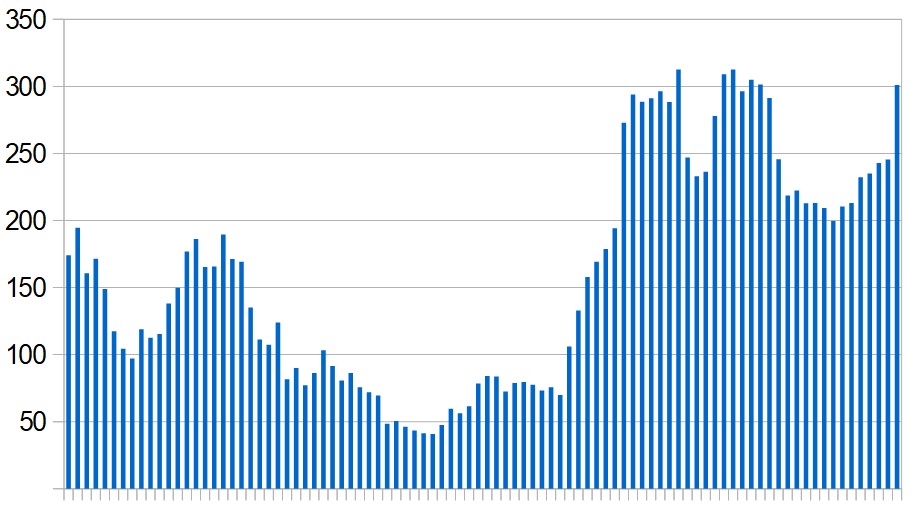 |
Morocco seemed to be making good progress until recently. A strict lockdown had kept the total of known Covid-19 cases below 10,000 and by early June new infections had fallen to around 40 a day. However, workplace infections have since caused some serious problems. During the past month the average number of new cases has fluctuated between 200 and 300 a day. On Friday, however, 570 new cases were recorded – the highest daily figure so far.
The customary Eid al-Adha prayers will not be allowed to take place in mosques this year. The ministry of Islamic affairs is urging people to pray at home instead.
For more information see: Covid-19 in Morocco
Confirmed cases: 18,834
New cases in past week: 2,108
Active cases: 2,435
Deaths: 299
Tests carried out: 1.1 million
OMAN
Oman has so far recorded almost 74,000 cases – most of them during the past month.
A new lockdown will begin later today and is due to last for two weeks. This includes a curfew from 7pm to 6am when movement on foot or in vehicles will be forbidden. Public spaces and shops will be closed and all gatherings are banned – including activities relating Eid al-Adha. Police say violators will be fined 100 riyals ($260).
Previously, most new infections were occurring among foreigners – predominantly migrant workers from poor countries. That has now changed and the majority are Omani citizens. The health ministry has blamed "continued indifference" by the public, saying that "most of the infections among citizens could have been easily avoided".
More than 600 medical staff in Oman have been infected with Covid-19 since the outbreak began, a government official said this week.
For more information see: Covid-19 in Oman
Confirmed cases: 73,791
New cases in past week: 9,598
Active cases: 20,426
Deaths: 359
Tests carried out: 290,000
PALESTINE
Palestine, like Israel, is in the midst of a wave of new infections. More than 12,000 cases have been recorded since the outbreak began – half of them during the past two weeks. Hebron is the most seriously affected area, accounting for 55% of all confirmed cases.
Many of the recent infections are attributed to people ignoring the rules for social distancing, which the authorities have difficulty enforcing. The health ministry says more than 30% of cases are the result of Palestinians travelling to and from work in Israel which is in the second wave of its epidemic.
Fears of a major outbreak in Gaza have not materialised. Most of the known cases there were apparently due to contacts with Egypt.
For more information see: Covid-19 in Palestine
Confirmed cases: 12,427 (West Bank 9,147, Gaza 75, East Jerusalem 3,205)
New cases in past week: 3,372
Active cases: 7,303
Deaths: 71
Tests carried out: 155,000
QATAR
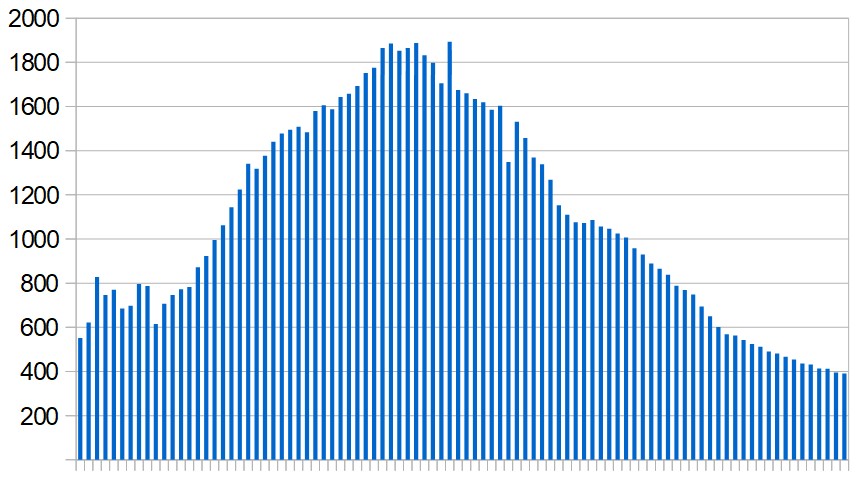 |
In population terms Qatar has more known cases than any other country – 38,500 per million inhabitants. Migrant workers have been disproportionately affected. Qatar's epidemic reached a peak in the first week of June and new cases have fallen steadily since then. During the past week new cases averaged 391 a day, compared with more than 1,800 a day at the peak.
Qatar is due to begin reopening its borders on August 1. Travellers from countries on its low-risk list will need to take a test at the airport and self-isolate for a week before taking a second test. Full details here.
For more information see: Covid-19 in Qatar
Confirmed cases: 108,638
New cases in past week: 2,740
Active cases: 3,054
Deaths: 164
Tests carried out: 464,000
SAUDI ARABIA
Saudi Arabia has the largest number of recorded cases among the Arab countries. New infections reached an initial peak in the fourth week of May, then dropped back slightly before rising to a higher peak in the third week of June. More recently, there has been a substantial improvement. During the past week new cases averaged 2,417 a day – about 2,000 below the June peak.
Migrant workers have been disproportionately affected but the authorities have also complained about non-compliance with precautionary measures by Saudi citizens.
The authorities have announced a series of precautions for the Hajj (the annual pilgrimage to Mecca) which is due to start on July 28 and normally attracts millions of Muslims from around the world. It will be restricted to about 1,000 participants who will be quarantined both before and after the event.
Although participation will be limited to people already living in the kingdom the Saudi authorities still want it to be seen as an international event and say 70% of places will be allocated to non-Saudi residents. They have also announced that anyone found "trespassing" on the holy sites during the Hajj will be fined 10,000 riyals ($2,666).
Touching the Kaaba will be forbidden, and pilgrims must wear masks and stay at least 1.5 metres apart. It's also reported that holy water from the Zamzam well will be pre-bottled and sterilised pebbles will be provided for the ritual stoning of the devil.
A number of healthcare workers have been invited to take part in the Hajj in recognition for their efforts during the epidemic.
For more information see: Covid-19 in Saudi Arabia
Confirmed cases: 262,772
New cases in past week: 16,921
Active cases: 44,369
Deaths: 2,672
Tests carried out: 2.9 million
SUDAN
The coronavirus struck Sudan in the midst of a political transition following a popular uprising against the regime of President Bashir and the country is ill-equipped to cope with a major epidemic. Testing is very limited and official figures don't reflect the full scale of the outbreak.
In a grim report on Thursday, the UN's Office for the Coordination of Humanitarian Affairs (OCHA) said transmission of the virus continues to increase and all of Sudan's 18 states are affected, with Khartoum, El Gezira, and Gedaref states among the hardest-hit.
The report continued: "Although Khartoum state accounts for about 70% of all reported cases in the country, over 60% of all Covid-19-related deaths have been reported from outside the capital. Some states have extremely high case fatality rates if compared with global trends, including North Darfur (30% of people with Covid-19 died), Central Darfur (33%), Red Sea (nearly 20%), El Gezira (15$). This could imply that a number of infections are not being diagnosed."
The OCHA has previously reported on the deterioration in Sudan’s health care system which was already "under extreme stress" before the arrival of Covid-19. It said 81% of the population have no access to a functional health centre within two hours' walk from their home. Some existing facilities have been closed due to virus outbreaks or lack of medical staff.
For more information see: Covid-19 in Sudan
Confirmed cases: 11,302
New cases in past week: 775
Active cases: 4,732
Deaths: 715
Tests carried out: (unknown)
SYRIA
According to the official figures, Syria's outbreak is still small but growing steadily. Only 608 cases have so far been recorded, but more than half of them have occurred this month. Official announcements rarely give any details.
On Monday health minister Nizar Yaziji spoke of a "remarkable increase" in infections during the previous two weeks and talked of a "wider outbreak" if people fail to observe preventive measures.
One problem appears to be that people with Covid-19 symptoms are reluctant to contact the authorities, and the regime has now set up a toll-free number (195) where the public are encouraged to report those they suspect of being infected.
In a series of tweets the Synaps Network says government secrecy about the situation has brought hospitals "under the purview of security officers, rather than healthcare professionals" – making health workers reluctant to report potential new cases.
On Thursday the authorities announced the closure of all halls used for weddings and funerals. Eid al-Adha prayers have been suspended in Damascus and the surrounding area.
Fears have been raised about north-western and north-eastern parts of the country which are outside the regime's control. Millions of displaced people are living in those areas and health services are often rudimentary. According to Syria in Context, 22 cases have now been confirmed by testing in the north-west. The first of these was a doctor working at a hospital in Idlib province who had a large number of contacts before testing positive.
Six cases were previously confirmed in north-east Syria. One died and the others have since recovered.
For more information see: Covid-19 in Syria
The following figures relate to regime-controlled areas only:
Confirmed cases: 608
New cases in past week: 112
Active cases: 389
Deaths: 35
Tests carried out: (unknown)
TUNISIA
There is currently little transmission of the virus inside Tunisia. New cases during the past week averaged 13 a day.
For more information see: Covid-19 in Tunisia
Confirmed cases: 1,425
New cases in past week: 89
Active cases: 251
Deaths: 50
Tests carried out: 88,000
UNITED ARAB EMIRATES
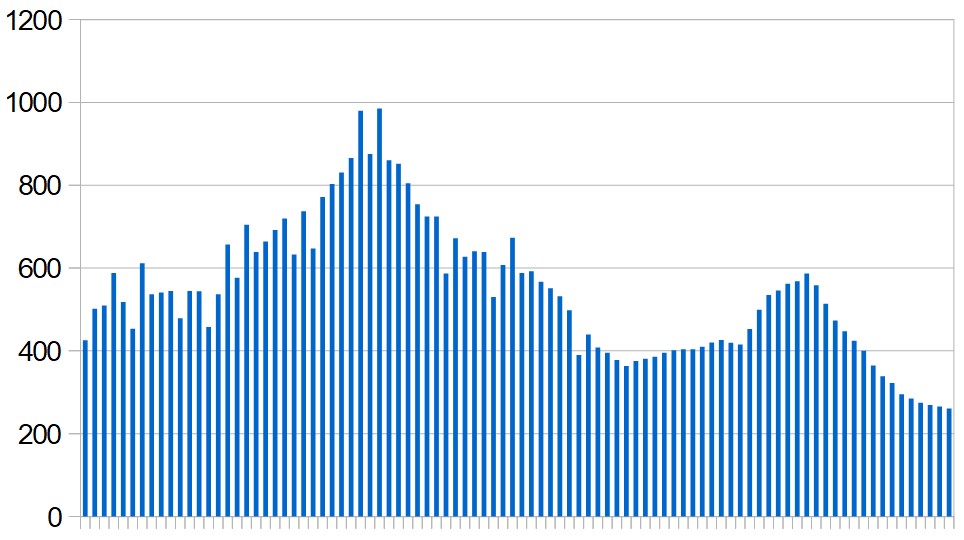 |
The UAE's epidemic peaked in the last week of May when new cases were running at more than 900 a day. New cases dropped below 400 a day towards the end of June. There was a small blip earlier this month but new cases are now on a downward trend again. The average during the past week has been 261 a day.
For more information see: Covid-19 in the UAE
Confirmed cases: 58,249
New cases in past week: 1,827
Active cases: 6,671
Deaths: 343
Tests carried out: 4.7 million
YEMEN
Official figures from Yemen are not credible. The evidence from unofficial sources is that many Covid-19 infections and related deaths are not being recorded.
Because of the ongoing war, Yemen already faced a humanitarian crisis before the coronavirus arrived. Millions are malnourished and vulnerable to disease, and health services are inadequate. Official figures do not reflect the severity of the epidemic. Unusually large numbers of deaths have reported, many of them from symptoms resembling Covid-19 and hospitals often refuse treatment if coronavirus is suspected. The Houthis, who control the capital, Sanaa, and much of the north, have a policy of not reporting cases so as to avoid lowering morale and distracting from their war effort.
For more information see: Covid-19 in Yemen
Confirmed cases: 1,678
New cases in past week: 98
Active cases: 426
Deaths: 470
Tests carried out: (unknown)

 RSS Feed
RSS Feed
